SUMMARY
This is AI generated summarization, which may have errors. For context, always refer to the full article.

MANILA, Philippines – The Philippine government under President Ferdinand Marcos Jr. and the National Democratic Front of the Philippines have agreed to revive peace talks, six years after the administration of Rodrigo Duterte walked away from the negotiation table.
Marcos Jr.’s Cabinet secretaries and the NDFP held separate press conferences on Tuesday afternoon, November 28, announcing the breakthrough agreement brokered between two parties on November 23 in Oslo, Norway.
“The parties agree to a principled and peaceful resolution of the armed conflict. Resolving the roots of the armed conflict and ending the armed struggle shall pave the way for the transformation of the Communist Party of the Philippines (CPP), New People’s Army (NPA), and NDFP,” the joint statement said, read by Presidential Adviser on Peace, Reconciliation and Unity Carlito Galvez Jr.
“The parties acknowledge the deep-rooted socioeconomic and political grievances and agree to come up with a framework that sets the priorities for the peace negotiation with the aim of achieving the relevant socioeconomic and political reforms towards a just and lasting peace,” it added.
On Tuesday evening, Marcos called on Filipinos to support the government’s “collective vision of peace, national reconciliation, and unity.”
“I firmly believe that we have taken a bold, meaningful, and optimistic step toward the fulfillment of this aspiration for all Filipinos,” he said.
External threats
The joint statement also took note of “foreign security threats facing the country” that prompted both parties “to unite as a nation.”
Defense Secretary Gilberto Teodoro Jr. later said maritime threats faced by the Philippines are among the catalysts resulting in the breakthrough.
In the past months, tensions between the Philippines and China continue to escalate in the West Philippine Sea.
“Obviously, we have an external actor who is acting irresponsibly and aggressively in the West Philippine Sea,” Teodoro explained. “It’s high time because of the world conditions that the volatility of geopolitical security, not only in the ASEAN theater, in our own environs, but in the world, necessitates a defense establishment that is threat-agnostic, but also geared towards addressing our vulnerabilities to external threats.”
‘Not a resumption’
Galvez said the joint statement does not mean a “resumption” of the peace talks, but a do-over.
“When you say ‘resumption,’ [it means] something was cut. This one, we will start anew,” he explained.
In July 2016, then-president Duterte declared a ceasefire with the NPA. The following month, the Philippine government began formal peace talks with the NDFP in Oslo.
In November 2017, Duterte formally terminated the negotiations, saying the communists “failed to show its sincerity and commitment in pursuing genuine and meaningful peace negotiations as it engaged in acts of violence and hostilities.”
‘No immediate effect’
Cabinet officials said there would be no immediate effect on the ground, with Philippine authorities continuing its crackdown on communist rebels for now.
“All security, law enforcement programs of the government shall continue,” Gilbert Teodoro said.
Potential changes on the terrorist tag of the CPP-NPA “will be part of the discussion,” Galvez added.
Long and winding road
The Philippines has Asia’s longest running communist insurgency, with the over five-decade-old conflict between Philippine authorities and the NPA resulting in the deaths of 40,000 people.
Tuesday’s development came just days after Marcos released numerous proclamations granting amnesty to rebels, fulfilling a promise he made during his second State of the Nation Address in July.
The announcement is a major turnaround from the position taken by the Marcos administration during the early days of his term, when the National Task Force to End Local Communist Armed Conflict (NTF-ELCAC) said it would not recommend restarting peace talks with communist rebels. – Rappler.com
Add a comment
How does this make you feel?
![[Newsstand] Time to negotiate peace again with the CPP-NPA](https://www.rappler.com/tachyon/2024/05/negotiate-peace-again-may-10-2024.jpg?resize=257%2C257&crop_strategy=attention)
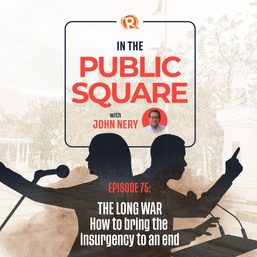

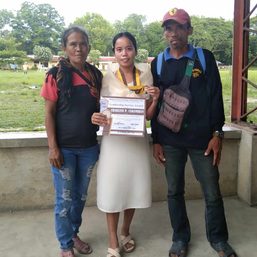
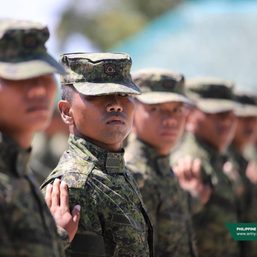



![[Just Saying] SONA 2024: Some disturbing points](https://www.rappler.com/tachyon/2024/07/TL-marcos-sona-points-july-23-2024.jpg?resize=257%2C257&crop=335px%2C0px%2C720px%2C720px)

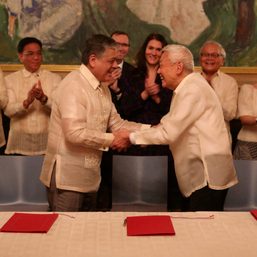
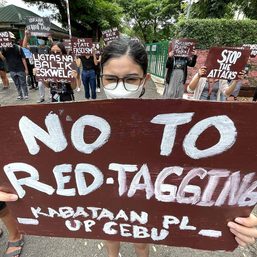
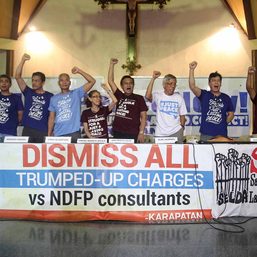
There are no comments yet. Add your comment to start the conversation.